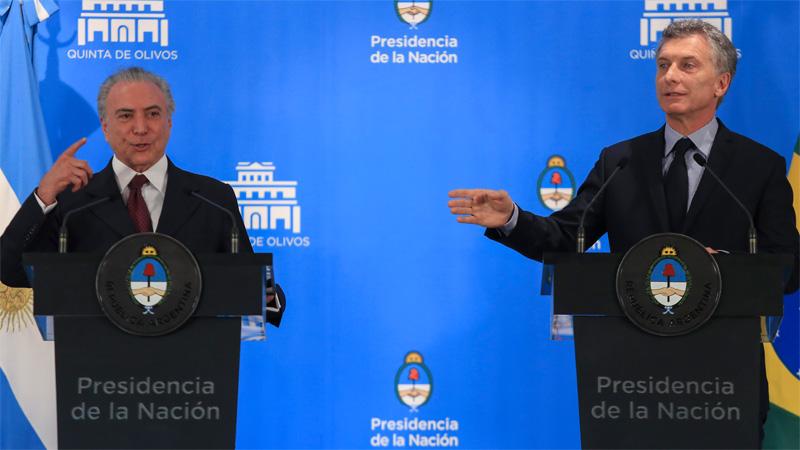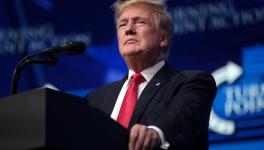Six South American Nations suspend participation UNASUR regional bloc due to US pressure

Argentina, Brazil, Chile, Colombia, Paraguay and Peru announced this week that they would indefinitely suspend their participation in the meetings of the Union of South American Nations (UNASUR). In a joint letter sent to the Bolivian Ministry of Foreign Affairs Fernando Huanacuni Mamani, who assumed the pro tempore presidency of UNASUR on April 17. They stated that their withdrawal was related to the lack of secretary general of UNASUR, though it happened just 2 days after Bolivia assumed presidency. Taking into account which governments have sent the letter, the move can be seen as another move by the growing neoconservative block in Latin America to break away at the projects of Latin American integration and move closer to the agenda of the United States.
President Nicolás Maduro of Venezuela responded to their announcement: “the regional right wing leaders allow themselves to be pressured by the US. I hope they have a little bit of South American consciousness. UNASUR deserves to be defended and although some try and wound it and leave it to bleed to death, today it is in the hands of the people”.
UNASUR was officially founded in 2008 in Brasilia to be a space of coordinated action and political and economic coordination between 12 governments in South America. Its founding is the result of years of work towards creating a South American regional block with a united political agenda and programs for social and economic development. The project was one of the many that was encouraged and developed during the cycle of progressive governments in Latin America that sought to create a counter-hegemonic regional response to the efforts of the United States to maintain their free access to Latin American labor, natural resources and markets and to counter their political agenda.
In July 2007, soon after its name was decided on as well as some of the internal agreements, Hugo Chavez commented on UNASUR and other projects of Latin American integration in a presidential address:
“We want a true integration and we have been supporting this integration and Venezuela knows this! How much effort have we put in and how much will we continue putting in for this integration? I will give an example. The UNASUR. Where was UNASUR born? In Margarita, in the Summit in April, after intense discussions around the name of the National Union or Union of South American Nations, and in Margarita the creation of a Permanent Secretary and several strategic lines of work were approved unanimously.”
“Our proposal of TeleSur is already a reality, as well as the University of the South and our missions like the Miracle Mission, the Literacy Mission, Petrocaribe, and the bilateral conventions of cooperation where Venezuela has made huge efforts to create cooperation with above all the weakest nations because that is what moves us, the Bolivarian spirit, it is the Bolivarian legacy, we will only be able to move forward if we are united, but really united, helping each other out. Only united can we create a political block in this part of the world, a world power in Latin America. Venezuela cannot do it alone, nor Brazil, or Argentina, none of us have what it takes to be a world power, we can only achieve this united and I am sure that we are working towards that.”
It has always been clear to the United States that a strong and united Latin America means that they can no longer impose their neocolonial project. It was this same unified Latin America that was able to defeat the US’s Free Trade Area of the Americas project once and for all in Mar del Plata, Argentina in 2005 when the US was unable to reach the agreements it needed in the Summit of the Americas. The Latin American left celebrated in the People’s Summit with the emblematic words of Chavez: “FTAA, FTAA fuck FTAA!”
At this time, the two largest countries involved in South America Argentina and Brazil were ruled by leftist, progressive governments and were integral supporters of these initiatives. Then in 2015 right-winger Mauricio Macri was elected in Argentina, and the strength of these projects of integration began declining. The parliamentary coup against Dilma Rousseff in 2016 that brought Michel Temer to power further consolidated this neoconservative offensive, and the countries remaining in these regional blocs were few. With the recent drastic policy changes of Ecuador’s president Lenín Moreno, the successor of Rafael Correa, who himself was also integral to these efforts, this bloc continues to shrink.
The latest move is another blow to the projects, though it is something that has been hinted at, since Macri took office there has been speculation that Argentina will leave UNASUR, especially after his suggestion of Secretary General was dismissed by the other countries, and in June 2016 his government ceased funding to the media project TeleSur tv.
While these governments leave the regional integration projects, they open the doors of their countries to transnational capital, international economic institutions, and increase militarization and “security” projects. They are passing regressive labor and pension reforms, allowing multinational companies to exploit their precious natural resources, stripping funds from public programs and services, privatizing the remaining public companies, essentially sacrificing their people to serve the interests of their local oligarchy, the United States and the transnational elite class.
In 2013 Rodrigo Cabezas, a Venezuelan economist and member of the United Socialist Party of Venezuela (PSUV) commented on the unique historical moment and efforts that allowed for the creation of UNASUR, his comments shine light on the moment that Latin America finds itself in now, as the circumstances have changed drastically, now the neoliberal economic model and the conservative social and political project have regained control:
“Of course UNASUR was only possible because in Latin America achieved an important political change, the prior decades were decades of neoliberal hegemony in economics and fascist dictatorships dominating the political-military area, which of course helped a sort of disintegration of Our America.
In this time, when the anti-neoliberal policies triumphed, in the political area, as a common denominator, it was possible to propose and strengthen the issue of economic and political integration with greater ease and of course the fact that the progressive, revolutionary, socialist, left wing, center-left and diverse governments were triumphing in South America, at the same time it allowed for the meeting of these people.”
Get the latest reports & analysis with people's perspective on Protests, movements & deep analytical videos, discussions of the current affairs in your Telegram app. Subscribe to NewsClick's Telegram channel & get Real-Time updates on stories, as they get published on our website.
























